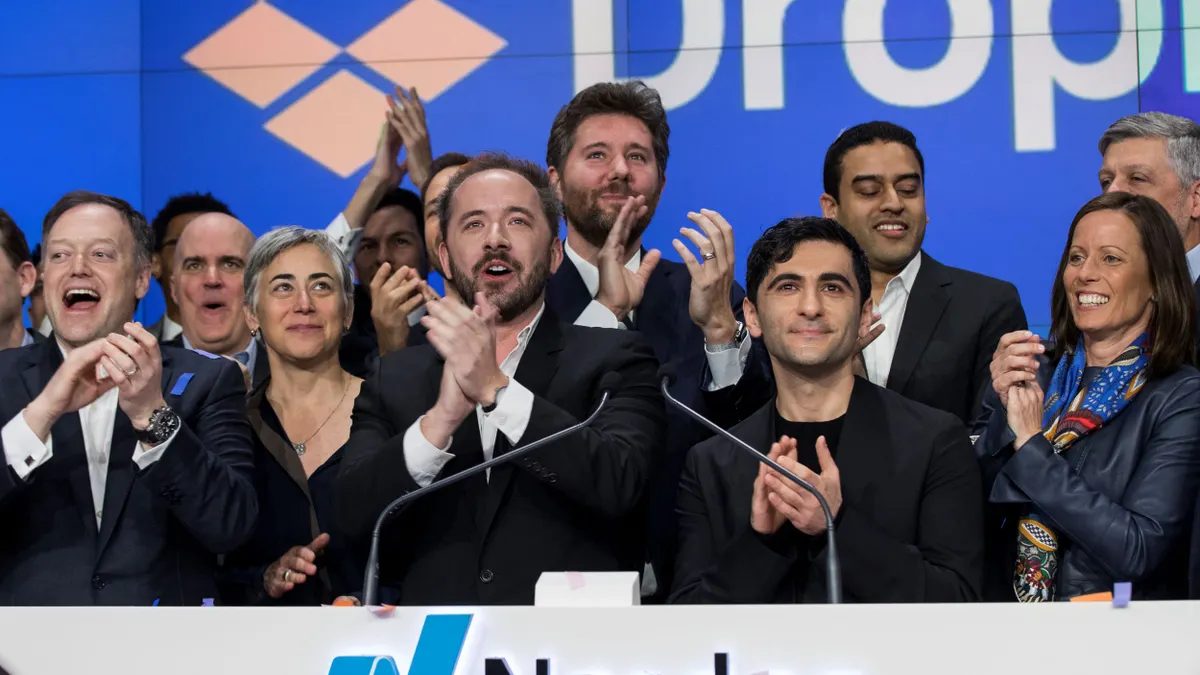While much of the focus on macroeconomic pressures has narrowed onto full-time workers, the 64 million Americans who undertook freelance work last year are also struggling against the impact of inflation. One of the things freelance platform Upwork is keeping a careful eye on is wage growth, for example, which slowed significantly last year and was flat on its own platform year-over-year, according to CFO Erica Gessert.
“We actually continue to see hours per job increase, but the wage per hour did not, and so that really does point to macroeconomic softness,” Gessert said of 2023 wages — something that, notably, has not diminished the demand for work.
Strong demand left undiminished
The increase of hours per job, but “basically flat” wage growth in 2023 “points to strong demand, but just kind of belt tightening or lower spend overall in the economy,” Gessert said. A 25-year veteran of the finance industry, she joined as Upwork’s finance chief last April with the goal of propelling the company forward for its next stage of growth, according to a press release announcing the move last March.
Before joining Upwork, she served an eight-year span at PayPal in a variety of roles, including most recently as senior vice president of finance and analytics and as its chief transformation officer. Before PayPal, she held numerous executive roles for telecommunications company Sprint, including vice president of finance operations, postpaid marketing and CFO of Sprint Prepaid.
Persistent inflation and a tight labor market have also impacted the dual sides of San Francisco, California-based Upwork in distinct ways, said Gessert.

The company provides both an online talent platform for individual freelancers in fields including everything from software development to writing and translation as well as products for enterprises seeking workforce management and talent, and cost pressures led many businesses to cut back on both staff and expenses.
“We saw that belt tightening on the enterprise side, we saw really, companies just pull back over on overall spend,” Gessert said of how economic pressures impacted enterprises. Upwork has continued to sign on new enterprises with “quite good momentum,” but they weren’t spending like they had previously, she said.
This, however, “represented a very different phenomenon than our core work marketplace,” Gessert said. The company has continued to see strong volume on its marketplace, in part because of the diversity of jobs available on the platform for freelancers outside of its diversity of potential fields, another reason volume on its marketplace might have remained strong could be due to the fact that companies restricted in their staff and resources still need to get their work done, Gessert said.
“This is another phenomena that I've seen over the years and years and years that I've run finances for companies, which is, even when companies go through a belt tightening period, the amount of work that needs to get done does not decline,” she said.
Tech and talent clash
As it keeps its eye on wage growth and other factors that could impact the freelance world, Upwork is also leaning on the potential of emerging technologies like generative AI as it looks to execute on its mantra of “durable, profitable” growth, Gessert said.
Among other moves, the platform has partnered with ChatGPT creator OpenAI to create a generative AI app called Upwork Chat Pro, currently in beta, designed to help its freelancers complete their work faster and more efficiently, according to a company announcement. It has also partnered with companies including Coursera and Udemy to create training and educational content surrounding generative AI use and applications.
“We've got a tremendous investment in our product, and that's really going to enable us to continue to grow the top line while also growing profitability,” Gessert said of such investments.
The announcements dovetail with strong growth by Upwork for its most recent quarter ended Sept. 30, where the company increased its research and development expenses by 16% year-over-year to reach $43 million in a bid to reach its goal of being the premier AI-enabled work platform, while reducing spending in other areas such as sales and marketing. Among other growth metrics, Upwork also reported GAAP net income of $16.3 million for the quarter, compared to GAAP net loss of $24.8 million in Q3 of 2022.
Already, the focus on generative AI is yielding some fruit: generative AI categories at the company were up 34% quarter-over-quarter in Q3, CEO Hayden Brown said during the company’s earnings call in November.
“I think there are tremendous opportunities for a business like ours, a work marketplace, to really benefit from the advances in technology that we're seeing across the world right now, including AI,” Gessert said.
Upward is aiming to become the premier AI-enabled work platform at time when the labor market is complicated by both inflation and the prospective impact of emerging technologies like AI.





















